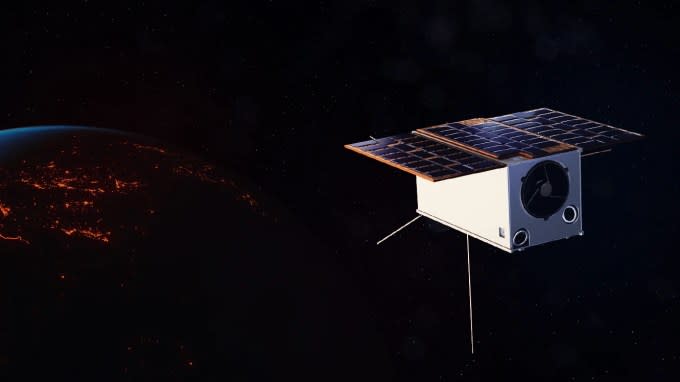A U.K. space startup has revealed plans to launch its first satellite as part of SpaceX’s rideshare program, ushering in what it claims will be a “new era of space research,” where astronomy data is collected, packaged and sold “as a service.”
Similar to previous missions, SpaceX’s Transporter 15 program next year will use a Falcon 9 rocket to transport payloads from third-party companies into space — including that of London-based Blue Skies Space, which has revealed that its inaugural Mauve satellite will be part of the launch in October 2025.
The satellite, which is designed to complement data provided by existing astronomical efforts such as that of the famed Hubble Telescope, will be focused on stellar spectroscopy (the spectrum of light emitted by stars), which can convey information such as star composition, temperature, density, mass, distance, luminosity and more.
“Mauve is designed for long observation campaigns of hundreds of stars in our galaxy, which will help the science community in progressing key research on stars,” Blue Skies Space CEO and co-founder Marcell Tessenyi told TechCrunch.
Among the proposed scientific use cases include the study of stellar flares, looking at their frequency, energy distribution and physical properties; the remit may also cover magnetic activity of exoplanet hosts to reveal the effects of UV radiation on photochemistry.

While there are other private companies gathering and monetizing space data, many of these are either ground-based telescopes looking at deep space, or satellites providing observation data about Earth. Blue Skies is differentiating by gathering data about space from space, and making it easy to access through a subscription-based membership model. This program already includes researchers from Boston University and the National Astronomical Observatory of Japan, which signed up prior to launch to help shape the program design — including decisions around where the Mauve satellite should be looking in space, and for how long.
“No private company is providing astronomy data as a service; we will be the first,” Tessenyi said. “We bring new science satellites and datasets to the community and make this available to anyone who wants to join. This new approach really gives the science community greater agility and complements the large, high-capability and high-demand facilities typically delivered by government agencies.”
The company has raised around $6.5 million in total since its inception, roughly two-thirds of which has come from equity investments from a handful of investors including U.K. seed fund SFC Capital and Japan’s Sparx Group. The remainder has come in grants, including funds from Europe’s Horizon R&D program.
Commercialize the cosmos
Founded in 2014, Blue Skies Space is the handiwork of a team of academics, including Tessenyi, who has a doctorate in astrophysics from University College London (UCL). It has been a long slog to get to this point, with the startup going through what Tessenyi calls the “standard mission proposal processes” with the usual space agencies. However, with the advent of the so-called “new space” industry, characterized by private companies commercializing the cosmos, this is leading to new opportunities for companies of all sizes and focus.
“We spent many years engaging with the global science community, validating our model and better understanding their science and data needs,” Tessenyi said. “A lot has happened within the business to enable the launch of the Mauve, but also ‘new space’ drastically transformed the space ecosystem over the past 10 years, during which we have been able to find the right manufacturing partners and team members to implement our vision.”

Rather than building its own satellites, Blue Skies outsourced the engineering work to more experienced manufacturers, including Hungary’s C3S and Dutch company Isispace, with Blue Skies setting and converting the scientific requirements into technical specifications. This includes a 13cm telescope and a UV-visible spectrometer.
In tandem, Blue Skies is developing a second satellite dubbed Twinkle, which will be built by Airbus. This will pack a larger telescope and visible-IR spectrometer, coupled to a Teledyne sensor, and will focus specifically on spectroscopic measurements of distant exoplanets’ atmospheres.
Blue Skies hasn’t revealed how much its membership will cost, noting only that it will make this information available “soon.”
Despite its funding and efforts to launch an actual satellite into space, Blue Skies remains a fairly svelte operation: It claims just 12 employees, based out of the U.K. and Italy.
EMEA Tribune is not involved in this news article, it is taken from our partners and or from the News Agencies. Copyright and Credit go to the News Agencies, email news@emeatribune.com Follow our WhatsApp verified Channel





